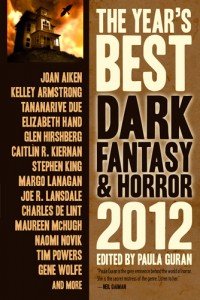“Four Legs in the Morning” by Norman Prentiss will be appearing in Prime’s forthcoming Year’s Best Dark Fantasy & Horror: 2012 edited by Paula Guran. Pre-order here!
“Four Legs in the Morning” revolves around the ancient Oedipus Rex play. What is it, you think, that causes some stories to last and deepen in meaning while others disappear?
I’m going to answer this question as a horror author, and say that the lasting stories often have some element of horror in them, even if they’re not technically classified as horror. They connect with readers’ deep fears. Oedipus Rex is a play about identity, with a great man doing his best to escape an unthinkable fate—and then slowly realizing he’s failed. I think Oedipus experiences a sense of growing cosmic dread similar to what Lovecraft writes about.
Then again, a comedy or romance writer would answer the question differently!
Dr. Sibley says “All the answers are in the text.” Do you agree with this sentiment? Why or why not?
Well, I conceived Dr. Sibley to be a mysterious character, but he’s also a parody of a rigid and out-of-date academic. He treats the literary text as if it’s sacred or magical—which is a limiting perspective for a scholar to take (it rejects so many modes of modern and post-modern criticism), but is a perfectly understandable perspective for someone who, himself, might be magical.
Why does your story propose a different answer to the Riddle of the Sphinx?
I’d always had a little trouble with this riddle, similar to the ideas expressed by the story’s protagonist. The traditional “solution” is elegant and interesting, but it isn’t really fair. We’re supposed to respect Oedipus for solving the riddle, but what if he simply got lucky, or happened to be thinking outside the box in just the right way, that particular moment? I wanted to imagine a more tortured—and at the same time, less poetic—solution to the riddle, and that’s where I went with the story.
The other factor was that I’d made Dr. Sibley the chair of a university English and classical literature program, so he should have particular texts that fascinated him—the Sophocles play being one. That brought me to the Riddle of the Sphinx, and I latched onto the title of “Four Legs in the Morning” as something that was allusive and elusive at the same time—mysterious, I hope, in the same way I intend Dr. Sibley to be for readers.
